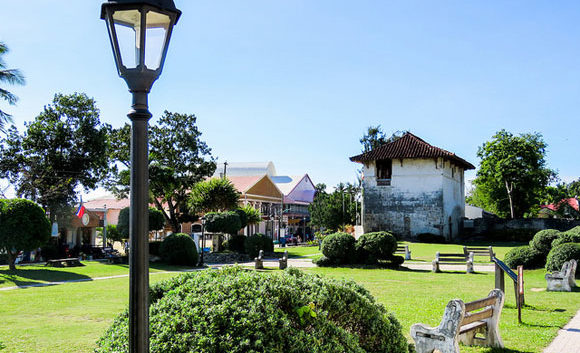Below is a sample monthly budget for two people living comfortably in the Philippines:
| Expense | U.S. $ |
| Townhouse (two-bedroom, communal pool) | $950 |
| Internet | $23 |
| Maid | $30 |
| Gardener | $30 |
| Local dinner including beer (four times a month) | $27 |
| Fancy international restaurant dinner with wine (twice a month) | $38 |
| Island Hopping adventure (including food and beer) | $65 |
| Electricity (including AC) | $76 |
| Two-hour massage | $10 |
| GP visit | $5 |
| Dentist visit and cleaning | $19 |
| Water | $3 |
| Pay TV | $21 |
| Groceries | $228 |
| Monthly Total | $1,525 |
As with anywhere, the cost of living in the Philippines will depend greatly on the lifestyle you choose to lead—but you can certainly live well here on a low budget. If you live like a local, shop where they shop, eat where they eat, you can get by on a monthly budget of just over $760, even near some of the big cities and famous beaches.
Of course the bigger the budget, the more lavish the lifestyle. A couple can live like royalty on $2,280 a month anywhere in the Philippines. For that money, you can enjoy life’s finer things…massages… maids…country club membership…travel…
Since rent will be your biggest expense, it’s important to take time to find the right property. The best—and cheapest—way to find a place isn’t through a real estate agent, but by word of mouth. If you like city living then you could consider Cebu City, one of the largest cities in the Philippines and home to all the shops, restaurants, and bars you could want. As an added bonus, the beach is only a 30-minute drive away. Rents in the city are higher, but you can get a one-bedroom, furnished apartment with city and ocean views for under $760.
Move out of the city a little and costs go down considerably. There are three-bedroom townhouses in Banilad—a trendy neighborhood about four miles from the heart of Cebu—that rent for $535 a month. In Liloan, a district about 10 miles from the city, you can rent a house for as little as $215 a month.
With a more generous budget, you can get serious bang for your buck, a three-bedroom beach house, close to amenities, with a pool and garage, can be had for less than $1,295 a month.
No matter where you choose to live in the Philippines, you won’t have to purchase your own vehicle—unless of course you want to. The Philippines are known for their kooky modes of public transport and they’re so cheap that many people forgo that big purchase. A local tuk-tuk or scooter taxi will cost pennies per ride and the longer trips on a jeepney won’t be much more. If you choose to splash out, you can pick up a brand new scooter from as little as $1,065, or a secondhand one for around $380.
When it comes to food, costs will depend on whether you splurge on imported brands from back home or switch to local brands, which are cheaper. The most cost-efficient way to shop is at local daily markets which are brimming with fruit, vegetables, meat, and seafood. Not only is it the cheapest option, it’s also the freshest. Most likely that delicious, juicy pineapple was grown at a local farm. A dozen eggs will cost $1.50, a kilogram of beef is $5.10, two pounds of tomatoes is $1.10, and a loaf of bread is the same price.
Eating out won’t break the bank either. In local restaurants, you will spend less on a meal than a five-minute taxi ride would cost you back in the U.S. A plate of barbecue meat and rice and a beer will set you back $3.50. A cappuccino will cost around $2.10 and a three-course meal for two can be enjoyed for $15.
The dollar stretches further here which leaves more space in any budget for fun adventures and a little luxury…the way a retirement should be.

